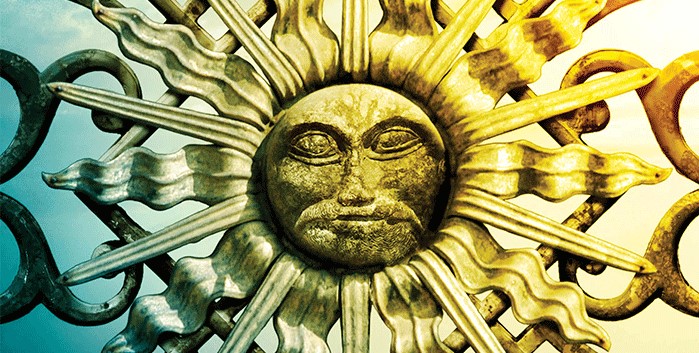
“It seemed to him that people must pass through each other’s lives all the time, touch them, be touched by them. Leave something behind, maybe, like a star that fell – you became a memory”
I had heard the name Guy Gavriel Kay in fantasy circles for years as being one of the Canadian greats, so when I saw this book during a recent haul I figured that it was finally time that I give him a try for myself. This book juggles 5 principle perspectives simultaneously and examines how they are individually impacted a holy war which surrounds them based heavily around the conflicts of Renaissance Europe. There’s Danica: a young woman seeking vengeance after the death of her family (accompanied by her canine companion Tico), Pero: an artist who has been tasked with going to a foreign land to do a portrait of their leader, Leonora: a woman with a tragic past who now works as a spy while posing as the wife of a doctor, Marin: the handsome charismatic son of a wealthy merchant, and Nevan: a young man who was abducted as a child and trained to become an elite solider. It’s difficult to give a more general synopsis of the overall plot, as the story follows each of their personal quests and how they meet, diverge and intertwine, and while I thought this story was held back slightly by the lack of strength in its’ characters, it was still and enjoyable and immersive read.
Now don’t get me wrong, I didn’t think that anyone in the main cast was bad necessarily. It’s just that novels narratively structured around having multiple perspectives usually benefit from having at least one character that each reader can gravitate towards, and yet I didn’t find myself particularly invested in any one in this book. This was a shame as I thought that the premises of each of these characters had so much potential! However, as I got further into this story I realized the situations that these characters were in were more interesting than the characters themselves. For me they just felt a bit bland, and I think the novel might have benefited from there being a bit more dramatic of a contrast between their personalities, or perhaps even just be reducing the number of POVs so that more time could be given to fleshing out their characters. If I had to pick a standout, I suppose it would be Pero (the painter), as it was very interesting seeing a relatively normal person such as him suddenly being thrown into a unfamiliar nation steeped in political drama and watching as attempted to navigate through it without getting himself killed.
I also think it’s worth noting that the changing perspectives may take a while to settle into while reading, as it shifts at multiple points within each chapter without a clear establishment of whose perspective it is, and many times the POVs would briefly extend beyond those of the main 5 characters. Needless to say, it made for a somewhat disorienting reading experience initially (at least for me). However, I’d say that about 100 pages in I really got the hang of distinguishing each perspective with relative ease when it wasn’t immediately made obvious, but there’s a good chance that that’s longer than it took most other people. Something that Kay did with these multiple POVs that was interesting was showing an event from one perspective, and then repeating the same scene from another perspective. This was at it’s most effective during important story beats that effected multiple characters, however, I found that the impact of this lessened as the novel went on, and more often than not I found myself annoyed with having to essentially re-read the same event multiple times… to the point that it occasionally slowed the pacing more than it had to.
I have to commend this book on the scope and complexity of it’s world-building though. It’s clear that Kay has a vast knowledge of the European Renaissance and all of it’s politics, religion and culture on which this story is based. If anything, I feel badly that many of it’s more clever and understated allegorical parallels are likely lost on me, as I wouldn’t exactly call myself a history buff in regards to this period. In fact, I would say that this novel reads a lot more like historical fiction than fantasy , as the only somewhat magical element to it seemed to be the presence of the spirit of Danica’s deceased grandfather and his unique ghostly abilities. For me, this book’s greatest strength was in Kay’s writing style. His language was so lush and poetic, but in a satisfyingly simple way, and in my opinion it really elevated many of the novel’s weaker elements.
“It happens this way sometimes, we can discover truths about ourselves in a moment, sometimes in the midst of drama, sometimes quietly. A sunset wind can be blowing off the sea, we might be alone in bed on a winter night, or grieving by a grave among leaves. We are drunk in a tavern, dealing with desperate pain, waiting to confront enemies on a battlefield. We are bearing a child, falling in love, reading by candlelight, watching the sun rise, a star set, we are dying . . . But there is something else to all of this, because of how the world is for us, how we are within it.”
So based on my own reading experience and what I’ve read online, the general consensus seems to be that this might not be the best novel to try to break into Guy Gavriel Kay’s writing with. The sizable main cast, constantly shifting perspectives and vastness of his world can take some getting used to as a first-time consumer of his work, however the quality of his writing style and unique narrative concepts still made this a pleasant read for me. (3.5/5)
